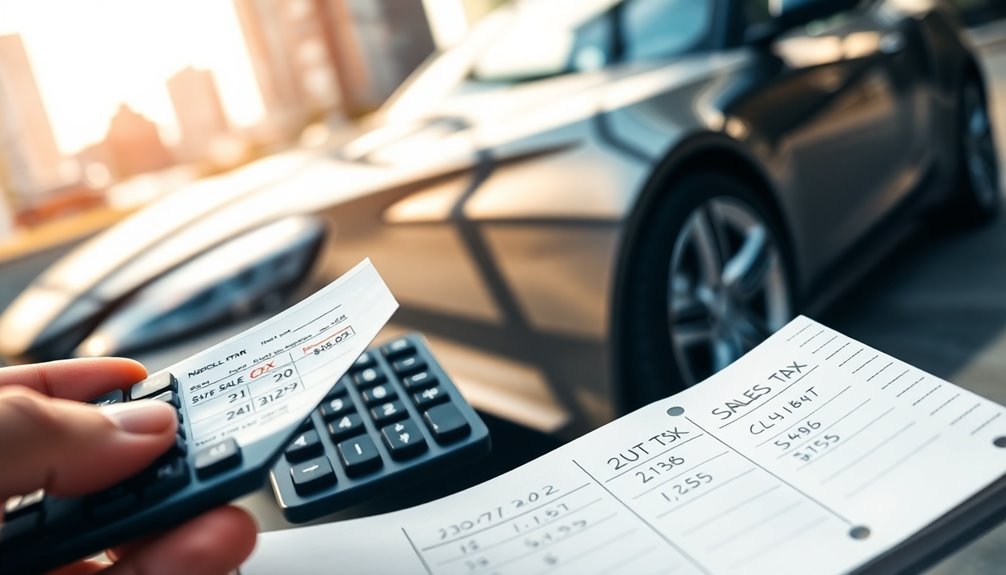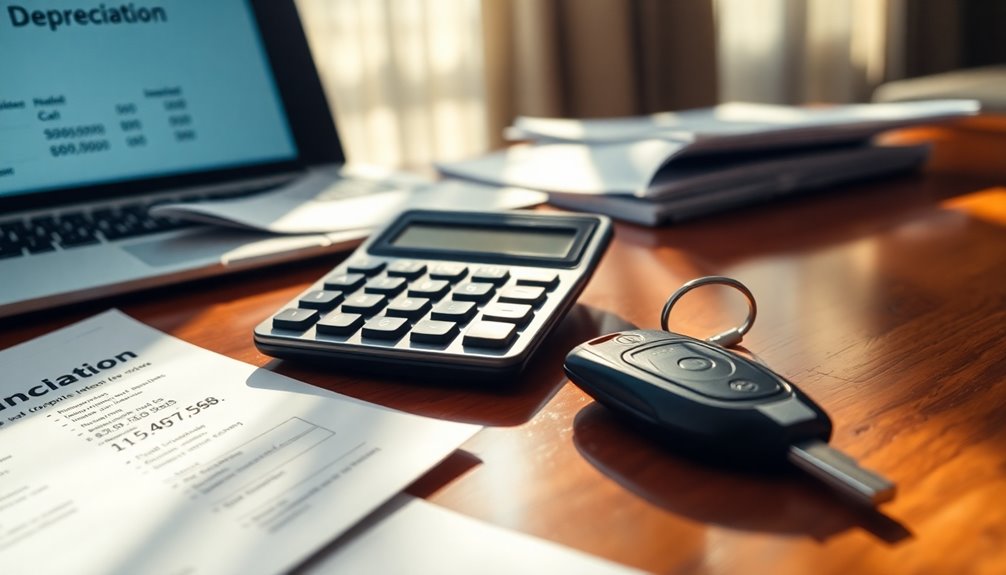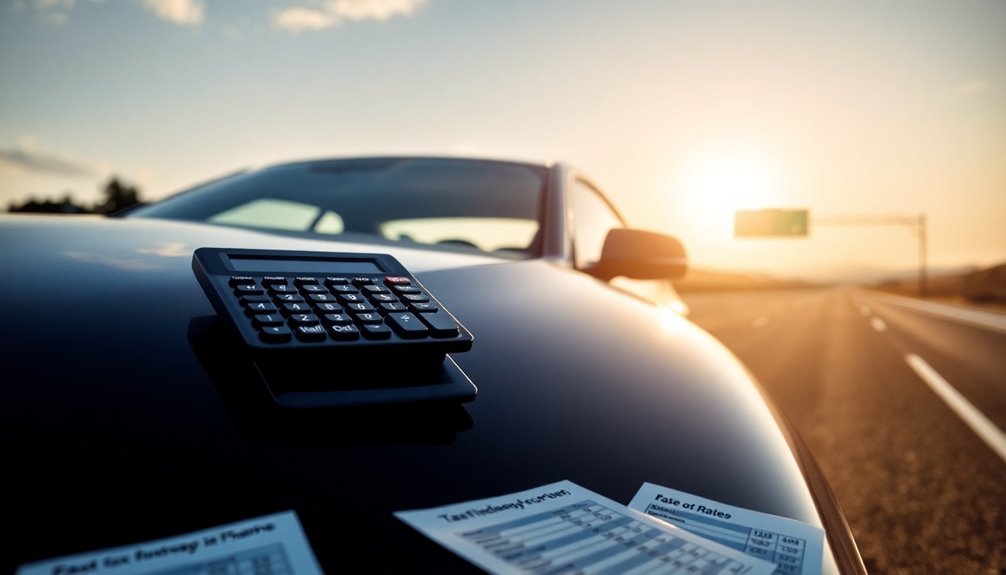To calculate taxes on a car, start by determining the sales tax rate in your state, which varies significantly. For example, if you're buying a $15,000 car and your state has a total tax rate of 6%, you'll owe $900 in sales tax. Don't forget about any local taxes that may apply. If you're using the car for business, consider the depreciation methods like the Straight-Line Method or MACRS, which can affect your tax calculations. Also, keep in mind any additional taxes such as the Highway Use Tax if applicable. There's much more to explore!
Key Takeaways
- Determine the applicable sales tax rate for your state, which can vary significantly across states.
- Calculate the sales tax by multiplying the purchase price by the state and local tax rates in decimal form.
- Consider any exemptions, such as Florida's tax on only the first $5,000 of the purchase price.
- Account for other vehicle-related taxes, including registration fees and federal taxes based on the manufacturer's sales price.
- Keep detailed records of business versus personal use to accurately report and deduct vehicle expenses for tax purposes.
Understanding Sales Tax

When buying a car, understanding sales tax is crucial because it can significantly impact your overall purchase cost. Sales tax rates vary widely by state, with some states like Nevada having rates as high as 8.25%, while others like Alaska, Delaware, and Montana impose no sales tax at all.
In California, the base rate is 7.25%, but local taxes, such as an additional 2.25% in Los Angeles County, can raise that total. You'll need to consider both state and local tax rates when calculating your tax liability. For instance, if you buy a $15,000 car in an area with a 4% state tax and an additional 2% local tax, your total sales tax would be $900.
Remember to convert the tax percentages to decimals before performing the calculation. Also, keep in mind that various factors, like whether the car is new or used, and its energy efficiency, can influence the tax rate you'll face.
Finally, some states have unique tax structures, like Florida, which only taxes the first $5,000 of the purchase price. Knowing these details helps you budget more accurately for your new vehicle. Additionally, it's important to note that in many states, the sales tax applies to the full purchase price of the vehicle, including any added fees or extras, which means that the tax applies to what you actually pay.
Calculating Depreciation

Calculating depreciation on your vehicle is essential for understanding its diminishing value over time and maximizing your tax benefits. You can choose between two primary methods: the Straight-Line Method and the Modified Accelerated Cost Recovery System (MACRS).
Using the Straight-Line Method, you divide your vehicle's cost—minus any trade-in value—by its useful life, typically five years. This method gives you a consistent depreciation expense each year. For example, if you buy a car for $30,000 with a salvage value of $5,000, your annual depreciation would be ($30,000 – $5,000) / 5 = $5,000.
On the other hand, MACRS allows you to claim higher depreciation in the early years and lower amounts later on. For a $40,000 vehicle you place in service in 2021, you'd follow the IRS-published rates over five years, potentially fully depreciating the vehicle. Additionally, the vehicle's business use percentage can significantly impact the total deductible depreciation amount.
If your vehicle qualifies, consider Bonus Depreciation, which allows 100% depreciation in the first year for certain vehicles purchased between 2017 and 2022.
Keep in mind that the business use percentage and luxury automobile rules can affect your deductions.
Highway Use Tax Overview

Highway Use Tax Overview
Understanding the Highway Use Tax (HUT) is crucial for motor carriers operating in New York State. This tax applies to commercial vehicles weighing over 18,000 pounds or those with three or more axles. However, there are exemptions, including government-owned vehicles, school buses, certain agricultural vehicles, and emergency equipment. Additionally, the HUT is designed to ensure that commercial vehicles contribute to the upkeep of transportation infrastructure.
It's important to note that the HUT doesn't apply to toll-paid portions of the New York State Thruway.
To comply, you must register with the New York State Department of Taxation and Finance and obtain a HUT certificate. This involves submitting an application, providing vehicle details, and paying the necessary fees.
You'll need to file tax returns even if no tax is due, using either Web File or Form MT-903.
When calculating the tax, you have two methods to choose from: the gross weight method or the unloaded weight method. Once you select a method, you must consistently apply it for all vehicles for the year.
Maintaining accurate records of your trips and displaying the HUT certificate on your vehicle is essential for compliance, ensuring safer and more efficient roadways for everyone.
Personal Use Tax Implications

Personal use of a company car can significantly impact your tax situation, especially if you don't keep accurate records. All use of the vehicle is considered personal unless you document it as business use. This means you need to maintain separate records of business and personal mileage.
If you don't, the IRS will treat 100% of the vehicle's value as personal use, which includes commuting from home to work and running personal errands during work hours. To calculate the value of personal use, you can use methods like the General Valuation Rule, the Cents-Per-Mile Rule, or the Lease Value Rule. Whichever method you choose, it must be consistent and comply with IRS guidelines.
You also need to report the value of personal use on Form W-2 and ensure it's included in your wages. Employers must withhold federal employment taxes on this value, unless they opt out and notify you. Additionally, understanding the tax implications of personal use is essential for accurate reporting and compliance.
Keeping detailed records is crucial, as failure to comply with IRS rules can result in lost deductions for business use. Regularly review your calculations to stay compliant and avoid unnecessary tax liabilities.
Other Relevant Vehicle Taxes

When it comes to vehicle ownership, various taxes and fees can impact your overall cost. Besides the obvious sales tax, you'll encounter federal taxes on vehicles based on the manufacturer's sales price for cars, motorcycles, buses, and trucks.
Don't forget parts and accessories, which are also taxed this way, along with tires and tubes, subject to specific rates.
State and local registration fees vary significantly. For example, in South Carolina, a passenger car registration might cost you around $40, while motorcycles can be as low as $10. Additionally, vehicles like trucks over 26,000 lbs must show SSN or FEIN for registration.
If you own an electric or hybrid vehicle, expect additional fees, like the $120 charge in South Carolina.
Internationally, road taxes differ greatly. In Australia, they depend on state and vehicle type, while India calculates taxes based on engine capacity and other factors.
Japan has varying rates based on vehicle size, too.
Lastly, consider other one-time fees like title and plate fees, which could be $15 and $25 in New York respectively.
These additional taxes and fees can add up quickly, so it's crucial to factor them into your vehicle budget.
Frequently Asked Questions
How Do I Find My State's Sales Tax Rate for Cars?
To find your state's sales tax rate for cars, start by visiting your state's official revenue or taxation website.
They usually list the current rates and any specific details regarding vehicle purchases.
You might also check local government resources, as some areas have additional local taxes.
If you're uncertain, calling your local tax office can provide clarity, ensuring you've got the right information for your area.
Can I Claim Sales Tax as a Business Expense?
Yes, you can claim sales tax as a business expense.
If you purchase property or services for your business, the sales tax paid is part of the overall cost, which is deductible.
Make sure to keep detailed records and receipts to support your claims.
When you file, itemize these expenses on your tax return, and consider the IRS optional sales tax tables if you need help estimating your deductions.
What Records Should I Keep for Tax Deductions on My Car?
To maximize your tax deductions on your car, you should keep thorough records.
Maintain a mileage log that details dates, locations, and purposes of each trip. Collect receipts for fuel, maintenance, and any other related expenses, ensuring they're organized by business and personal use.
Document vehicle-related costs, like insurance and registration fees.
Lastly, retain all records for at least three years, ensuring they're easily accessible for tax time or audits.
Are Electric Vehicles Taxed Differently Than Gas Vehicles?
Yes, electric vehicles (EVs) are often taxed differently than gas vehicles. You might find federal tax credits available for EV purchases, which can significantly reduce your tax burden.
Some states offer additional incentives, but they may also impose higher registration fees on EVs. While EVs can be exempt from certain local taxes, the overall tax structure varies by state, so it's essential to check your specific location for accurate information.
How Often Do Sales Tax Rates Change for Car Purchases?
Sales tax rates can change frequently, often on a quarterly or annual basis, depending on where you live.
You'll find that local jurisdictions sometimes adjust rates on specific dates, like March 1 or June 1.
While changes usually get announced ahead of time, they can be influenced by local economic conditions or legislative actions.
It's essential to stay updated on these changes, as they directly impact your total cost when making purchases.
Conclusion
In conclusion, calculating taxes on a car involves understanding various factors like sales tax, depreciation, and specific vehicle taxes. By knowing how these elements interact, you can better estimate your overall tax liability. Don't forget to consider any personal use implications and highway use taxes that may apply. Staying informed will help you make smarter financial decisions when purchasing or owning a vehicle. So, keep these points in mind to navigate your car tax responsibilities more effectively!









